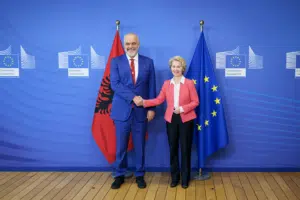Brussels – The cases are different, as are the places of detention and the motivations behind the choice of candidacy. But these 2024 European elections will also go down in history for the decisions of two parties in Italy and Greece to include a person detained in a third country in their respective electoral lists, opening up a potentially unprecedented scenario in Brussels on parliamentary immunity.

In addition to Ilaria Salis, an Italian citizen detained in Hungary for over a year in unacceptable conditions for an EU member country (only since May 15 has she been granted house arrest) and a leading candidate in the Northwest constituency with the Green-Left Alliance, the Greek Prime Minister Kyriakos Mitsotakis could open a post-election diplomatic case between Brussels and Tirana over his decision to nominate on the lists of the ruling New Democracy party one of the most controversial political figures for relations between the two neighboring countries: the ethnic Greek mayor of the Albanian municipality of Himarë, Fredis Beleri, who was sentenced in March in the first degree to two years in prison for buying and selling votes in the May 2023 municipal elections.
Beleri’s case had already emerged as a point of friction even at the European tables during the informal dinner between the heads of the EU institutions and the leaders of the Western Balkans, Ukraine, and Moldova held in Athens at the end of August last year. Missing from that meeting was only the Albanian Premier Edi Rama, who was not invited because of tensions between Greece and Albania over the detention of the elected mayor of Himarë, who was never able to be sworn in as he had been detained in jail for two days before the May 14 elections on charges of vote buying (the challenger and incumbent first citizen, Jorgo Goro, also went to jail for corruption). From that moment on, a diplomatic tug-of-war began between the Mitsotakis government and the Rama government, the former accused by Tirana of trying to influence an independent investigation into a figure associated with the 1994 armed insurrection of the Greek minority in Albania, the latter suspected by Athens of “human rights violations” and a “politically motivated” trial.

So far, the Greek government has failed to exert sufficient diplomatic pressure for Beleri’s release, and even the threats of negative consequences on Albania’s path to EU membership (with negotiations that started in July 2022) have not had the desired effect. Greece argues that the Beleri case should be seen as a European issue and not just a bilateral one — as it would concern respect for the rule of law and minority rights in a country aspiring to join the Union — but the forcing has annoyed some of the 27 Member States most supportive of accelerating the enlargement process, such as Germany. So the Greek Premier decided to take a more ‘original’ route and, on April 15, officially nominated Beleri as the 25th candidate (out of 42) on the New Democracy electoral lists. “His nomination has a very strong symbolism. Everyone who is really interested in the rights of the Greek ethnic minority in Albania understands that” Mitsotakis had said two days later on the sidelines of the European Council in Brussels.

In Greece, the voting system provides for preferences. With the appointment of Beleri, New Democracy shifts the center of gravity of the political discourse to the patriotic level, leveraging what has become a rhetorical battleground for Greek and Albanian nationalism. Technically, Tirana and Athens are still in a state of war — since 1940 when Albania was an Italian protectorate during World War II — and, despite the Treaty of Friendship, Cooperation, Good Neighborliness, and Security that has been in force since 1996, the two NATO members are experiencing escalating tensions on the diplomatic front, which also closely involve the EU institutions and the enlargement process. The election polls give New Democracy 33 percent, and it does not seem unlikely that Beleri could be among the eight MEPs elected thanks to the preference system, triggering the process for parliamentary immunity in Brussels.
English version by the Translation Service of Withub



![La presidente della Bce, Christine Lagarde [Francoforte, 6 marzo 2025]](https://www.eunews.it/wp-content/uploads/2025/03/lagarde-250306-120x86.png)

![Un atomo. L'Ue punta sul nucleare di nuova generazione per il suo futuro energetico [foto: iStock]](https://www.eunews.it/wp-content/uploads/2025/04/atomo-120x86.jpeg)
